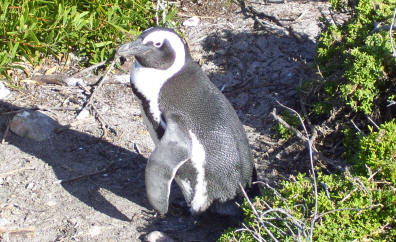|
Hermanus accommodation
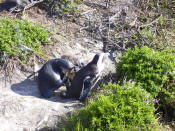
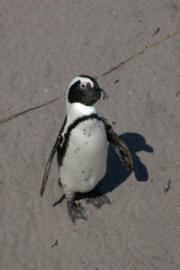
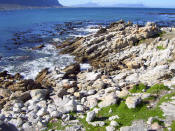
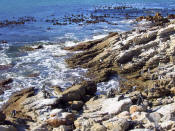
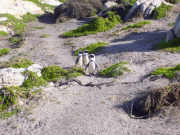
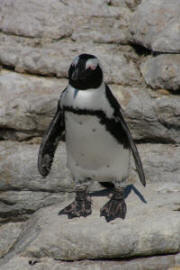
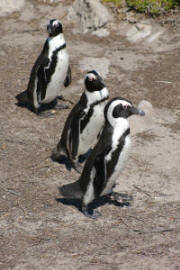
|
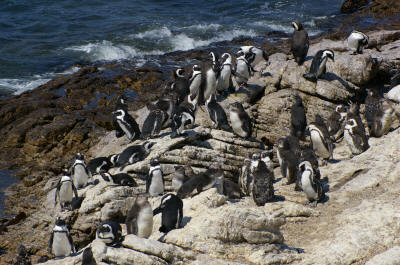
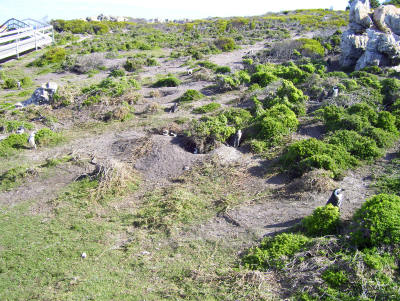
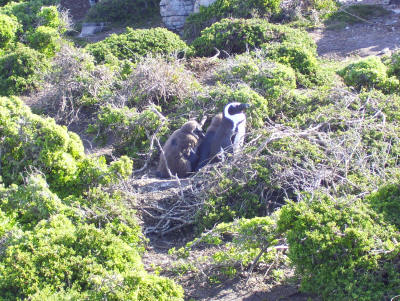
The penguins established themselves
at Stony Point at Betty's Bay. It is not well sign posted but there
are signs to Stony Point. It is off the R44 which is a lovely
coastal road from Gordon's Bay to Hermanus rivaling Chapman's Peak
drive for scenic beauty.
I believe it is far bigger and more natural than the penguins at
Boulders at Simonstown. The area is quite large and the nests cover
the entire area, some under the natural bush and some in "caves",
some just seem to be totally unprotected and in the open. Watching
the penguins make their way to the water is a treat as they are very
comical and unintentionally so. They look like the original clowns
on land and transform in water. The leaving and returning to land
looks very difficult with the waves swirling the penguins around and
onto the rocks but they take it all in their stride.
This
bird colony is situated in one of the most beautiful and interesting
seascapes along the African coast. It is the only area where
mountains are found in such close proximity to the sea. Several sea
birds breed in this colony, almost all of which are in decline.
All penguins are superbly adapted to a marine environment, where
they use their flippers to propel themselves through the water,
their feet acting as rudders. They can out-swim their many predators
in the water, but are vulnerable to predation on land from a variety
of foe, the main culprits being, the Large Spotted Genet. Genetta
tigrina, the Small Grey Mongoose Gaberella pulverulenta,. Kelp Gull
Larus domini canus, and Homo sapiens.
Penguins nests in burrows
or small depressions that they dig out, usually under vegetation or
rocks, they mate for life and both parents share the brooding and
feeding duties. Breeding occurs between February and October, and
the eggs, usually two, are incubated from about 40 days. Feeding of
chicks is by regurgitation of small fish and continues for about 11
weeks. The larger chicks leave the nest and tend to congregate in
creches, while their parents fish. The adults and some of the larger
chicks moult between November and January. During this 19 to 20 day
period, the birds cannot go to sea and have to fast for at least
three weeks. Loosing about half their body weight. Penguins are
easily disturbed by noise and sudden movements, but readily accept
people who do not pose a threat. |
Hermanus accommodation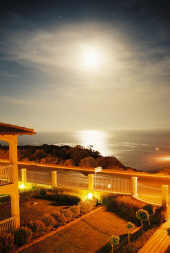
42 Westcliff Road
HERMANUS
Tel: 028 313 2806
Fax: 028 312 1360
Email
onthecliff@telkomsa.net
Tourist travel assistance
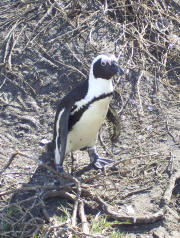
The African Penguin is Africa's only breeding
penguim, Spheniscus demersus, is listed as vulnerable in the Red
Data Book as its numbers have fallen by 13% per generation since
1974, there were an estimated 153 000. The main threats to its
continued existence are industrial over fishing around our coast,
oil spills and competition with Cape Fur Seals for space in the
breeding colonies. Up until 1982, all Penguin colonies were on
islands along the Cape and Namibian coasts. Since then these birds
have established themselves at the Boulders, Simons Town on the Cape
Peninsula and here at Stony Point. Although small by comparison,
these relatively new breeding sites, far apart from the more
established ones, are vital for the protection of this species
mainly from the many oil spills, which are an on-going threat, due
to the illegal flushing out of emptied oil tankers at sea. |

